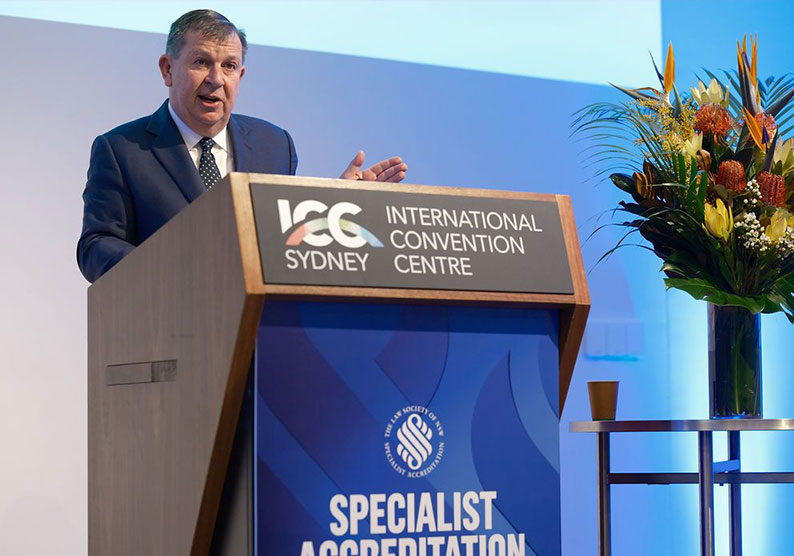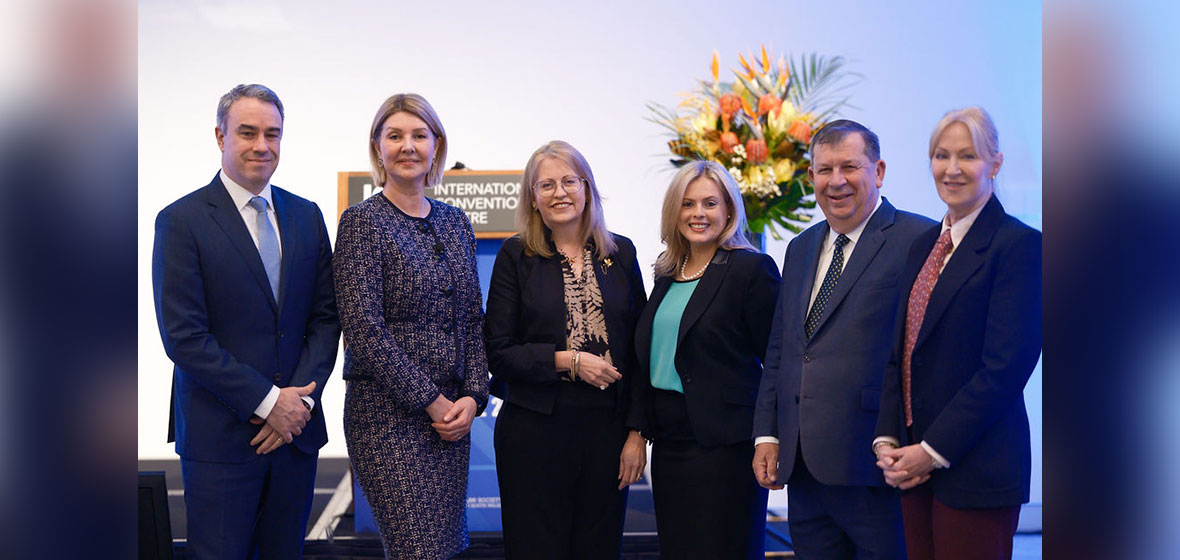The journey to obtaining specialist accreditation in a chosen practice area is one of dedication, perseverance and an ongoing commitment to improving the quality of legal services in New South Wales, according to Jacqueline Dawson, Chair of the Specialist Accreditation Board. The sentiments were expressed in her opening remarks to this year’s Specialist Accreditation Conference, recently held in Sydney.
This year marks Dawson’s fourth as Chair and she noted that obtaining Specialist Accreditation “affords recognition for those solicitors who have dedicated themselves to a branch of law.”
Last Thursday, 450 delegates, including esteemed members of the profession and judicial officers, gathered at the International Convention Centre (ICC) in pursuit of this commitment.
Dawson acknowledged the program’s level of difficulty. She also noted that becoming an accredited specialist demonstrates an “ongoing pursuit of excellence,” and said that by attending the conference, practitioners were engaging in continuing legal education aimed at furthering their knowledge in their areas of expertise.
Jennifer Ball, President of the Law Society of NSW, said that as a profession, there is a lot we can be proud of. “As the largest cohort of solicitors in the country, the work we do in New South Wales has a profound effect on the national legal landscape.”
Ball recognised that over the Law Society’s Specialist Accreditation program’s thirty-three-year history, it has responded to the evolving needs of the community. She noted that there are over 1600 Accredited Specialists amongst the solicitor ranks of the profession and said that “[h]aving a high standard to strive for elevates the profession…”
Following the announcement of the introduction of Elder Law as a new area of Specialist Accreditation last year, Ball announced that the inaugural Elder Law Advisory Committee has been appointed and is working on the development of the first assessments. She also announced that applications will open in December for the 2026 Elder Law program.

The keynote speaker at this year’s conference was the Honourable Andrew Bell, Chief Justice of New South Wales. The Chief Justice acknowledged the Specialist Accreditation program as a key part of the Law Society’s work. “It allows practitioners who have successfully navigated and satisfied the structured assessment process leading to accreditation to hold themselves out as specialists in particularly areas of practice,” he said.
Bell pointed out that Specialist Accreditation involves ongoing obligations. He said admission to the legal profession also involves the solicitor holding out that they have satisfied the requirements for admission under the Uniform Law Admission Rules.
Following his speech at the Opening of Law Term dinner earlier this year on the ‘Present and future challenges to the rule of law and for the legal profession,’ the Chief Justice provided a key update for the profession on the review and reform of practical legal training in NSW.
He noted the results of the PLT survey conducted earlier this year and said there was a “strong appetite for genuine change which improves not only the quality of young lawyers on entry … but also improves the experience of those young lawyers.”
His Honour encouraged the involvement of more senior legal practitioners, including retired lawyers, in the development and delivery of PLT units of practical training.
“Participating in the corporate life of the profession, including its training and education of its newest members, is an honourable and most worthwhile goal and will enhance the overall administration of justice in this State,” he said.
Elder Law, Wills & Estates
The Elder Law, Wills & Estates stream featured a comprehensive session on the evolving landscape of testamentary guardianship, a topic gaining prominence amid rising rates of separation and divorce. Esterina Azzi, Accredited Specialist in Wills & Estates, delved into the intricate interplay between state-based guardianship laws and federal family law, highlighting the challenges faced by practitioners and families.
Azzi discussed practical steps for clients, emphasising the importance of clear communication and realistic expectations. She said in her experience, clients often believe they can exclude an ex-spouse from parental responsibility through their will, but that’s not the case. Azzi recommended that parents document their wishes and consider appointing guardians who are prepared for the role, but also to seek specialist family law advice, especially in complex or contested situations.
The session showed there was a clear consensus that while testamentary guardianship remains a vital tool in estate planning, its effectiveness is limited by federal law, ongoing dialogue between estate and family law specialists, and potential legislative reform.
Family law
The family law stream contained interesting and recent updates in this area. The Honourable Judge Kylie Beckhouse of the Federal Circuit and Family Court of Australia provided a ‘view from the bench’ on how the Court has approached family violence following recent legislative reforms, significant recent decisions and property reforms, particularly where there are elements of family violence.
The stream also featured discussion of risk of harm to children in family law proceedings and a panel discussion, moderated by Brett McGrath, on the impact of technology in family law.
Personal Injury
The Personal Injury stream kicked off with an exploration of the intricate and evolving field of post-traumatic stress disorder (PTSD) claims, particularly for first responders and professionals who experience traumatic events. The panel consisted of Michael Bath, Partner, Carter Newell Lawyers, Professor Richard Bryant AC, Scientia Professor of Psychology at UNSW and Director of the UNSW Traumatic Stress Clinic, Chantille Khoury, Partner, Law Partners Personal Injury Lawyers, and moderated by Stuart Gray, Partner, Cardillo Gray Partners. They discussed significant legislative changes, including new rules and workers’ compensation reforms, and noted that personal injury claims are increasing in both number and complexity.
Khoury pointed to the judgement in the case of Kozarov v State of Victoria [2022] HCA 12 as an example of how a safe system of work “on paper (is) basically not enough.” She stressed the urgent need for employers to take more responsibility for the psychological well-being of their staff. “[E]mployers must be proactive in ensuring a safe system of work. They must implement, not just design, safeguards,” Khoury said.
The discussion also focused on the importance of distinguishing between a person’s subjective experiences and objective indicators of trauma, especially when liability and compensation are being decided in a legal context.




